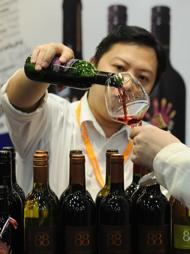
In the past year, China has overtaken the
UK to join the list of the world’s top five wine-consuming nations, according to new figures released by Vinexpo.
Results from the annual study by The International Wine & Spirit Research (IWSR) show that between 2009 and 2010 consumption of still, light and sparkling wines grew by 33.4% in China (and Hong Kong included), leading to a total of 156.19m 9-litre bottles being consumed in 2011, knocking the UK into sixth position in the world-wine consumption market.
In the five-year period from 2006 to 2010, China and Hong Kong’s wine consumption grew 2.4 times larger with the study forecasting a further 54.25% rise between 2011 and 2015.
“Every producer is now thinking ‘China, China, China’” said Robert Beynat, chief executive of Vinexpo.
Per capita consumption is also predicted to rise in China by 2015 from 1.9 to 2 litres of wine per person per year by 2015.
By comparison, French and Italian average yearly consumption per adult is expected to be around 50 litres by 2015 while Americans will be consuming an average of 13 litres per capita by the same date.
Meanwhile, the
U.S has displaced both
France and
Italy to come top in the list of the world’s biggest wine-consuming nations by volume.
In 2011, US consumption reached 311.3m cases – equivalent to 3.7 billion bottles – with the IWSR study forecasting a further 10% rise between 2011 and 2015.
In the UK, figures show a predicted 4.13% decline in consumption and a per capita drop from 26 litres per year to 24 litres in the next five years as consumers ‘drink better and less’.
“The economy influences consumption – there’s no doubt about that – and this crisis means that people are buying bottle by bottle, not case by case,” said Beynat.
The Vinexpo/IWSR study, conducted in 114 consumer markets and 28 producer countries, states total worldwide consumption in 2010 reached 2.6 billion cases (31.6 billion bottles) – a 4.5% increase compared to a previous study carried out in 2006.
The forecast for the next five years show a global consumption growth rate of 6.17%, reaching 2.844 billion cases, an increase of 2 billion bottles, by the end of 2015.
 In the past year, China has overtaken the UK to join the list of the world’s top five wine-consuming nations, according to new figures released by Vinexpo.
In the past year, China has overtaken the UK to join the list of the world’s top five wine-consuming nations, according to new figures released by Vinexpo.